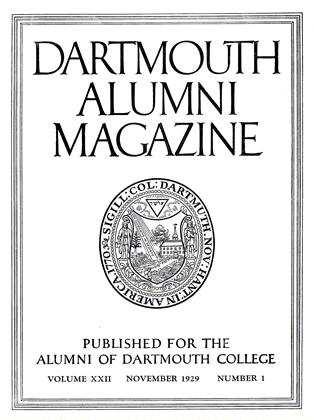There was a song in my college days to the tune of "My store on Salem street" about a bright-eyed professor who used to "flunk the boys way down in Culver hall," and the same bright-eyed professor who by lineal descent and personality had made himself an institution and a tradition used to visit us as alumni after we left Dartmouth and brought us cheery news of what was going on inside "Dartmouth's Classic Halls" as John G. Whittier spoke of them in Snow Bound. He was delegated to tell us of changes in the college, of the resignation of our beloved Dr. Tucker, or of new additions to the faculty. And once speaking in Springfield, Massachusetts, he outwitted the Associated Press by bringing news to the outside world of the burning of the grandstand and fence of the old Alumni Oval before the "übiquitous reporter" as he put it had been able to inform the outside world.
In other words, for fifty years there has been no closer observer of Dartmouth affairs who has been better able to carry news of these affairs to the outer world and do it with such grace and kindly humor that all who received such news were charmed. With pen and ink, and now perhaps with typewriter, he chronicles constantly the most human side of the history of the college, and he did it long before Lytton Strachey made popularized history fashionable. Those of us who live in Hanover count it a fortunate day when we meet Professor Bartlett on his morning excursion to the post office or bookstore and get from him always some cheery remark on past or present events.
And he has chronicled in his book A Dartmouth Boohof Remembrance some of the things that used to please us so much when he told us about them. It has been said, and perhaps with much truth, that there has been more change in the world in the past twenty years than in the preceding hundred, and in such case the recollections of forty or fifty years ago should be all the more valuable to us. When Hanover had no lights at night, when there were no telephones, when the stage coach ran to the Junction, when men boarded themselves, when seniors taught school in the long vacations, when every theme was embellished with Latin and Greek, when horses and carriages were still in use,—when class feeling ran high, and college men did not believe that "pranks" were unsophisticated,—all these vanished days are chronicled in this book. Professor Bartlett is the very emeritus of our scribes, a delightful personality, known and esteemed by us all. And we like his book.
 View Full Issue
View Full Issue
More From This Issue
-
 Article
ArticleThe Class of 1933
November 1929 By E. Gordon Bill -
 Article
Article"ORIENTATION:" The Opening Address of Dartmouth's 161st Year
November 1929 -
 Lettter from the Editor
Lettter from the EditorEditorial Comment
November 1929 -
 Class Notes
Class NotesCLASS OF 1911
November 1929 By Prof. Nathaniel G. Burleigh -
 Class Notes
Class NotesCLASS OF 1929
November 1929 By Frederick W. Andres -
 Class Notes
Class NotesCLASS OF 1909
November 1929 By Robert J. Holmes







